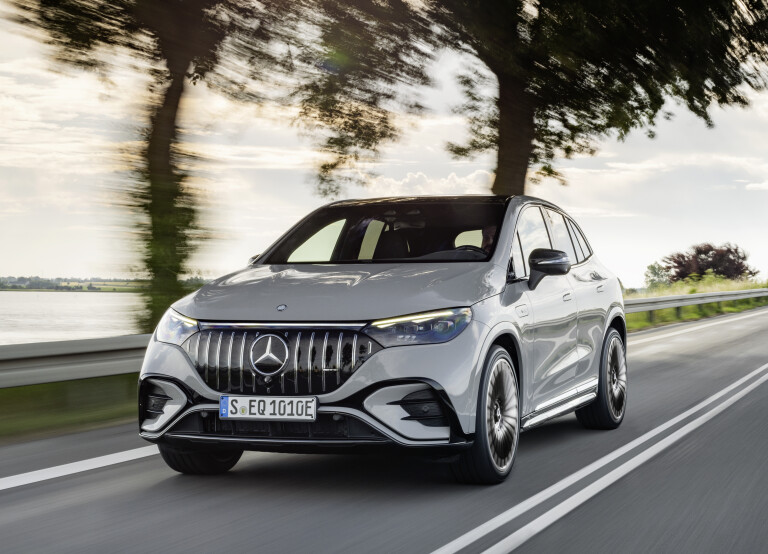
Snapshot
- 2023 Mercedes-Benz EQE SUV revealed, here mid-year
- 90.6kWh battery, driving range of up to 590 kilometres
- Mercedes-AMG EQE 53 SUV unveiled with 505kW/1000Nm
The 2023 Mercedes-Benz EQE SUV has been revealed ahead of its Australian launch in mid-2023.
It is the eighth model in the expanding Mercedes-EQ electric vehicle family, following the larger EQS SUV unveiled earlier this year.
Whereas the upper-large seven-seat EQS SUV is the high-riding version of the EQS flagship sedan, the large five-seat EQE SUV is a taller version of the EQE sedan – and an electric alternative to the GLE large SUV.
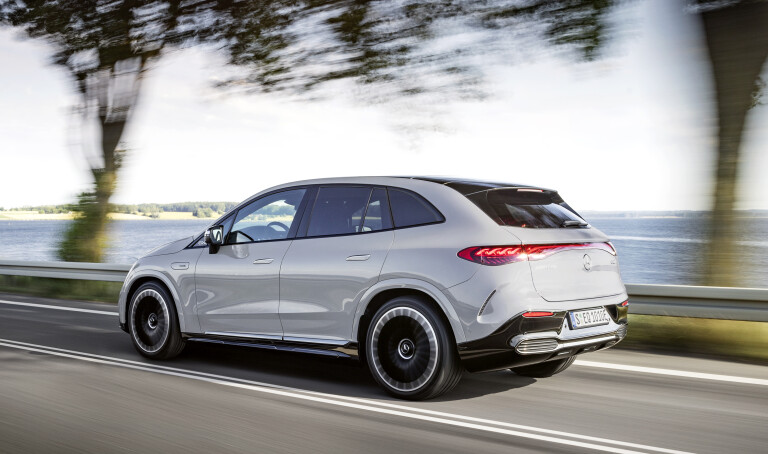
It is underpinned by the same EVA architecture, with a range of available powertrains – including a performance Mercedes-AMG version – and the latest technologies, including the Hyperscreen tri-display dashboard.
In Australia, the EQE SUV will be initially offered in three forms: the EQE 300 RWD, EQE 500 4Matic, and the AMG EQE 53 4Matic+.
JUMP AHEAD
- Battery, performance, charging and driving range
- Exterior design
- Interior comfort and technology
- Infotainment
- Dimensions and storage
- Safety features
- Availability
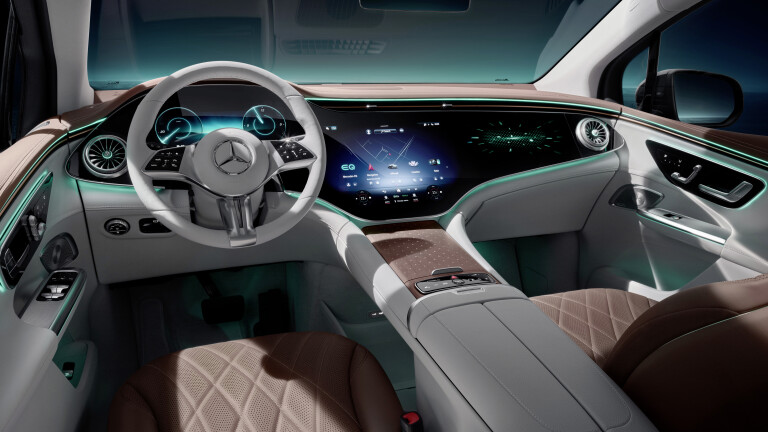
Battery, powertrains, charging and driving range
Three variants will be available at launch – the rear-wheel drive EQE 300, the all-wheel drive EQE 500 4Matic, and the AMG EQE 53 4Matic+.
BATTERY
Under the skin, the EQE SUV features a 90.6kWh lithium-ion battery pack, which provides energy to a single- or dual-motor system.
It features a unique six-phase, permanent-magnet design and is comprised of 10 per cent cobalt, with over-the-air updates for the battery management software.
PERFORMANCE
The entry-level EQE 300 is powered by a single electric motor on the rear axle, with more information expected in the coming months. It is likely to offer around 180kW.
A mid-spec EQE 350+ is offered in other markets, producing 215kW and 565Nm. Mercedes-Benz has yet to confirm performance figures for the non-AMG EQE SUV.
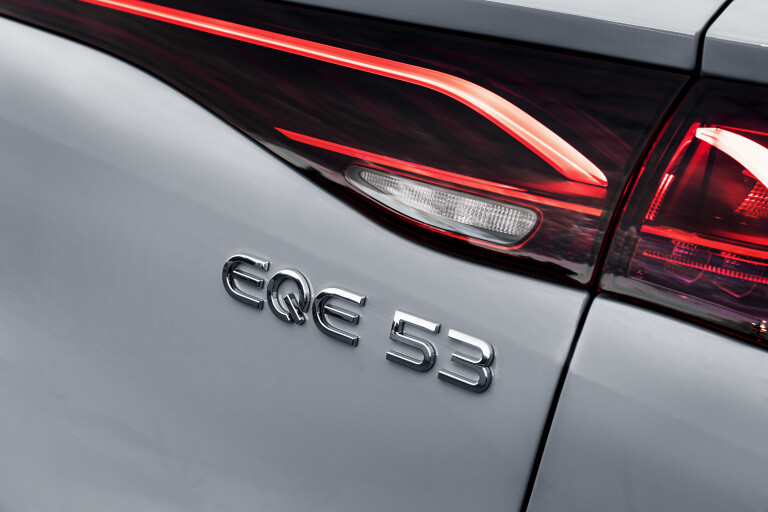
Meanwhile, the all-wheel drive EQE 500 4Matic features the same battery pack, but sports a dual-motor setup producing 300kW and 858Nm.
The flagship AMG EQE 53 develops 460kW and 950Nm in standard form – opting for the AMG Dynamic Plus performance pack adds 45kW and 50Nm, for 505kW and 1000Nm in total.
It is headlined by a 3.5-second 0-100km/h sprint time with the optional performance pack, and a 220km/h top speed (240km/h with the performance pack).
A less-powerful AMG EQE 43 is available in other markets, but it is off-limits for Australia (for now). It produces 350kW and 858Nm, with a 4.3-second 0-100km/h time and a 210km/h top speed.
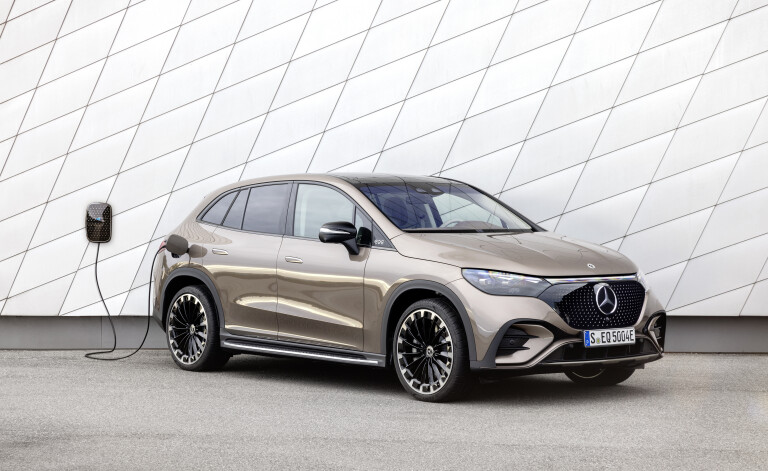
CHARGING
As standard, DC fast-charging up to 170kW is offered, which enables around 220 kilometres of driving range after a 15-minute top-up.
AC charging at up to 11kW is available, while a 22kW on-board charger is optional, helping to reduce charge times at home and the office.
Like the EQE sedan, Japanese-market examples will be compatible with bi-directional charging, allowing for vehicle-to-grid (V2G) and vehicle-to-home (V2H) compatibilities to redirect power back into the electrical grid or the owner’s home.
A heat pump is standard to preheat or cool the battery while driving for optimal charging efficiency.
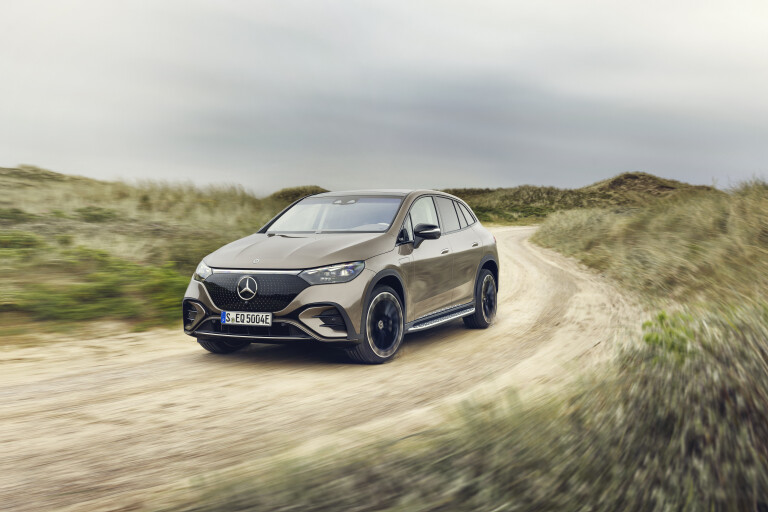
DRIVING RANGE
According to Mercedes-Benz, the EQE 350+ SUV has a WLTP-rated driving range of between 480km and 590km – down slightly on the EQE 350 sedan but ahead of its closest rival, the BMW iX xDrive40 (420km).
Expect a similar figure for the EQE 300.
The dual-motor EQE 500 has a claimed driving range between 460km and 547km, while the flagship AMG EQE 53 reduces this to between 375km and 470km.
With three stages of regenerative braking available, including a ‘one-pedal’ mode to bring it to a complete stop, the vehicle can recuperate up to 260kW.
MATCH-UP
| MODEL | POWER | BATTERY | RANGE | 0-100 KM/H | MAX CHARGE RATE |
|---|---|---|---|---|---|
| Mercedes-Benz EQE 500 SUV | 300kW/858Nm | 90.6kWh | 547 km | N/A | 170kW |
| Mercedes-AMG EQE 53 SUV | 460kW/950Nm (505kW/1000Nm w/ AMG Dynamic Plus pack) | 90.6kWh | 470 km | 3.5 seconds (w/ AMG Dynamic Plus pack) | 170kW |
| BMW iX xDrive50 | 385kW/765Nm | 112kWh | 630 km | 4.6 seconds | 200kW |
| BMW iX M60 | 455kW/1100Nm | 112kWh | 566 km | 3.8 seconds | 200kW |
| Audi E-Tron 55 | 300kW/664Nm | 95kWh | 446 km | 5.7 seconds | 150kW |
| Audi E-Tron S | 370kW/973Nm | 86kWh | 413 km | 4.5 seconds | 155kW |
| Polestar 3 | 360kW/840Nm (380kW/910Nm w/ Performance Pack) | 111kWh | 610 km | 5.0 seconds (4.7s w/ Performance Pack) | 250kW |
Note: List scrolls horizontally.
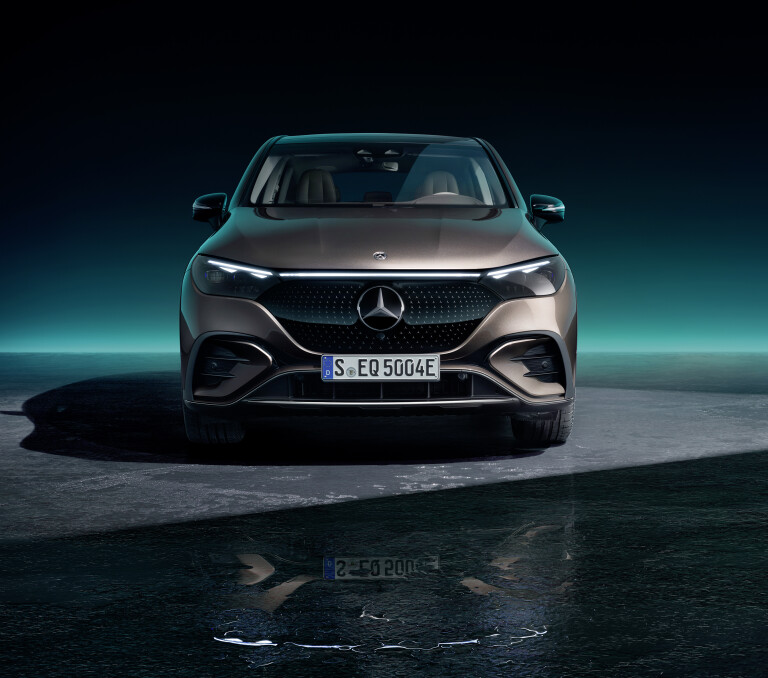
Exterior design
Perhaps unsurprisingly, the EQE SUV is directly inspired by its EQE sedan sibling, with a closed-off front end, front and rear light bars, and pop-out door handles.
An AMG Line package with sportier design elements is optional, while the alloy wheels sit between 19 and 22 inches in diameter.
Mercedes-Benz has focused on aerodynamics – with short overhangs and a sleek shape – but it hasn’t revealed its drag coefficient at this stage. For reference, the larger EQS SUV is rated at 0.26 Cd.
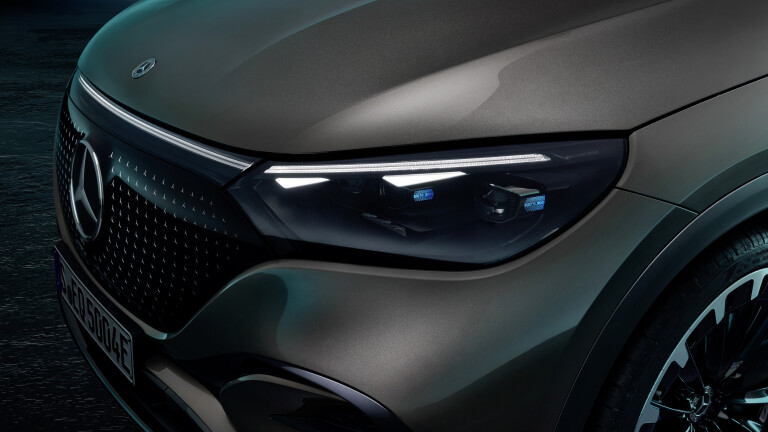
The standard LED headlights can be upgraded to the Digital Light matrix-LED system, which includes road projection in select markets. This will become available in a future remote software update, displaying markings and warning symbols on the road.
A new ‘Serene Breeze’ exterior driving sound has debuted on the EQE SUV, which is said to offer a “relaxed and natural” tone, while it also includes an optional artificial interior sound.
The optional air suspension can raise the body by 30mm below 60km/h, while it is lowered between 10mm and 20mm to reduce wind resistance above 120km/h.
As expected, the EQE SUV features optional rear-axle steering up to 10 degrees, which reduces the turning circle from 12.3 to 10.5 metres (standard on the EQE 53, with electromechanical anti-roll bars).
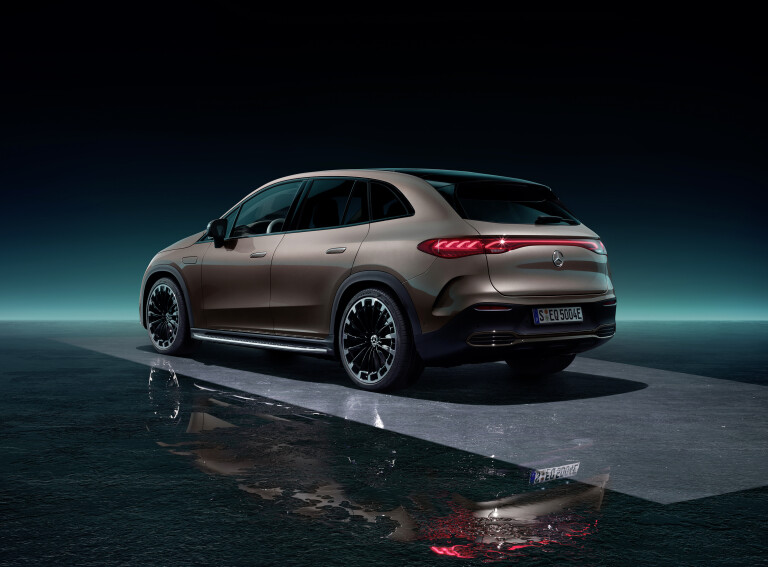
Available drive modes include Eco, Comfort, Sport and Individual, while all-wheel-drive models feature an Offroad selection, which adjusts slip depending on conditions, and enables or disables stability and traction control.
AMG versions also include Slippery and Sport+ drive modes but omit the Offroad configuration. The AMG Dynamic Plus pack adds a Race Start button, with unique artificial sounds and the full 505kW on tap.
It has an 1800-kilogram braked towing capacity for AWD models, while RWD versions are limited to 750 kilograms.
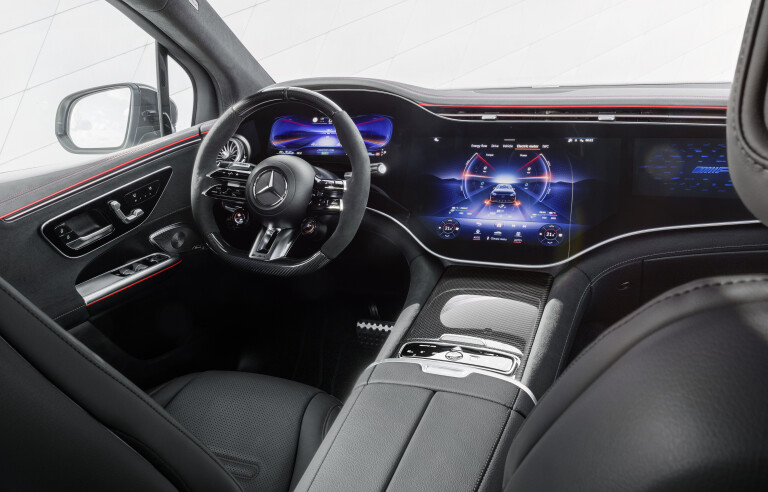
Interior comfort and technology
Mercedes-Benz has virtually copied the design of the EQE, EQS and EQS SUV for the EQE SUV’s cabin, featuring a tri-display setup, turbine-like outer air vents, a free-standing centre console, colour-adjustable ambient lighting, and quilted Nappa leather upholstery.
The luxury marque offers five co-colour combinations with warm and cool tones, including brown, grey and blue/black.
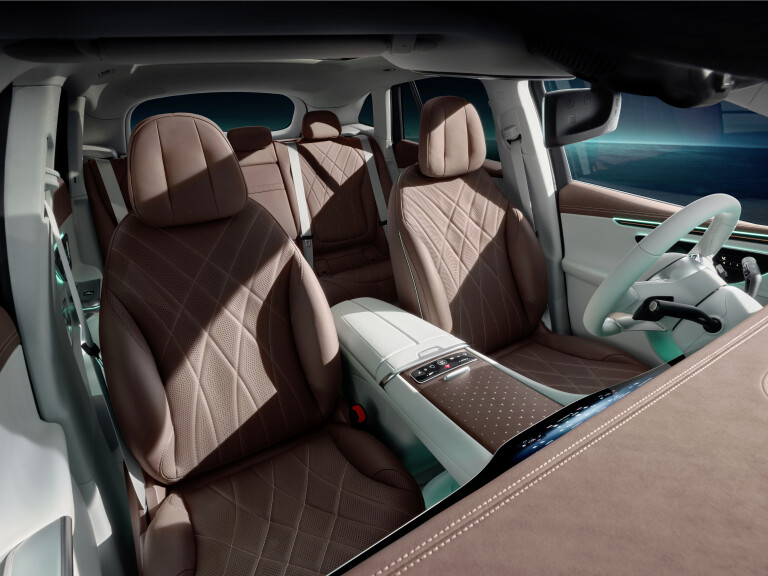
Nappa leather is optional, while the standard interior utilises vegan leather.
In addition, there are wood and aluminium elements, and the laser-cut backlit three-pointed star trim on the centre console.
As announced last year, the EQE SUV is one of several models to feature Dolby Atmos compatibility, which provides a 360-degree audio experience similar to that available in cinemas and selected headphones.
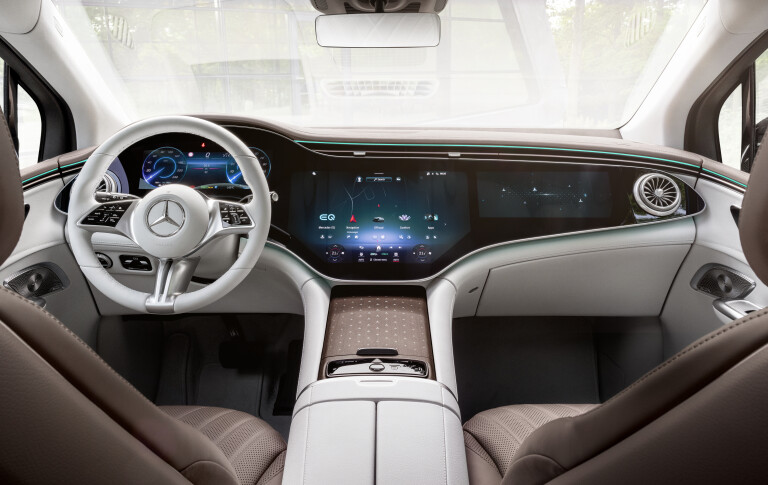
Infotainment
The central 17.7-inch infotainment system, running the latest version of the MBUX operating system, supports over-the-air software updates, the ‘Hey Mercedes’ voice assistant, machine learning, and custom driver profiles.
Mercedes-Benz has partnered with American tech company Zync to offer on-demand video, music and sport from “more than 30” streaming services at launch, accessible by subscription.
It is joined by a 12.3-inch digital instrument cluster and an optional 12.3-inch passenger touchscreen, known as the MBUX Hyperscreen.
To learn more about the MBUX Hyperscreen, read our Australian first drive of the Mercedes-AMG EQS 53 by clicking here.
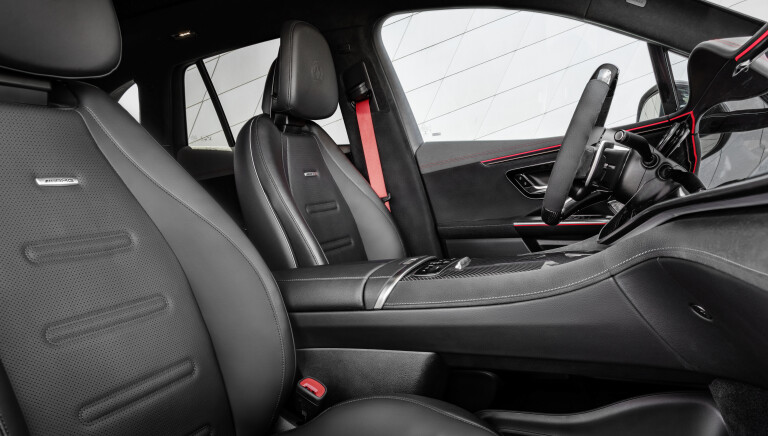
Dimensions and storage
The new EQE SUV measures 4863mm long, 1940mm wide and 1686mm tall, which is 61mm shorter in overall length, 8mm narrower and 110mm lower than a GLE – but its wheelbase is 35mm longer, maximising interior space.
Interestingly, its wheelbase is 90mm shorter than the EQE sedan, while the SUV is 173mm taller.
There is 520 litres of boot capacity behind the second row, and 1675 litres with the rear seats folded.
| MODEL | WHEELBASE | LENGTH | BOOT | FRONT STORAGE | WEIGHT |
|---|---|---|---|---|---|
| Mercedes-Benz EQE SUV | 3030mm | 4863mm | 580-1675L | none | ~2600kg |
| BMW iX | 2997mm | 4953mm | 500-1750L | none | ~2500kg |
| Audi E-Tron | 2928mm | 4901mm | 660-1725L | 60L | ~2500kg |
| Polestar 3 | 2985mm | 4900mm | 484-1411L | 32L | 2200kg |
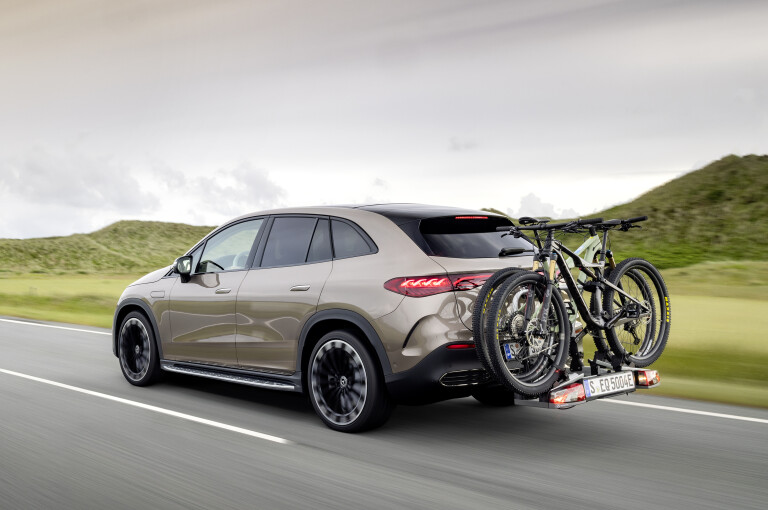
Safety features
Mercedes-Benz claims the lack of an engine block allowed it to improve safety in a frontal crash, with “verified and extensive component tests” performed during the development stage.
It includes eight airbags (dual front, side, curtain, driver’s knee and front-centre) as standard, while rear-side units are available to protect second-row passengers in a side collision.
| ACTIVE SAFETY FEATURES |
|---|
| Autonomous emergency braking (vehicle, pedestrian, cyclist, junction and reverse) |
| Lane-keep assist |
| Lane change assist |
| Blind-spot alert |
| Rear-cross traffic alert |
| Side collision detection |
| Driver fatigue monitoring |
| Evasive steering assist |
| Adaptive cruise control |
| Emergency stop assist |
| 360-degree camera system |
| Traffic sign recognition |
| Rear seat reminder. |
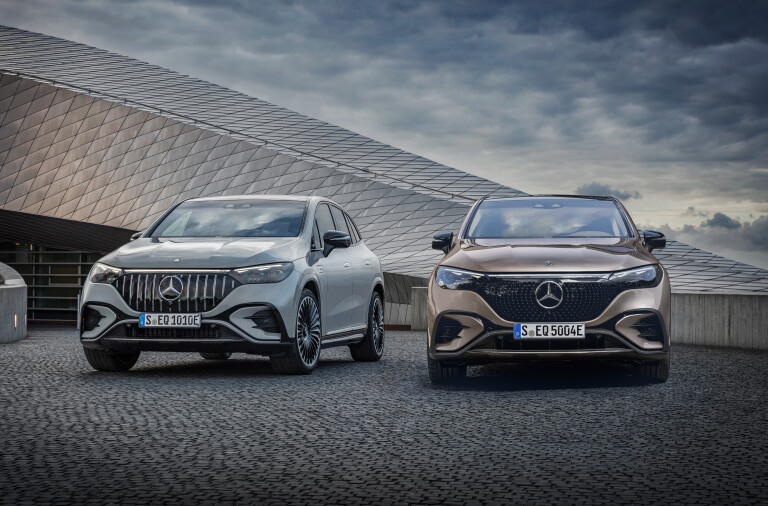
Availability
The 2023 Mercedes-Benz EQE SUV will arrive in Australia in mid-2023, with full details and pricing to be announced closer to launch.
It will commence production at Mercedes-Benz’s facility in the United States in December – joining the EQS SUV, GLE and GLS.
With fierce competition from the BMW iX, Audi E-Tron and Polestar 3, expect it to start from around $150,000 plus on-roads locally.
The smaller, outgoing GLC-based Mercedes-Benz EQC medium SUV is priced from $122,724 before on-road costs, extending to $139,723 for the flagship variant.



COMMENTS